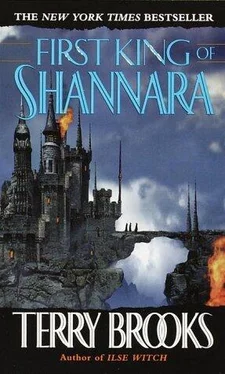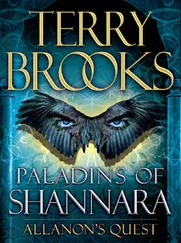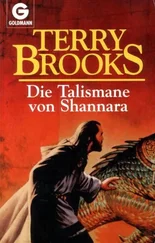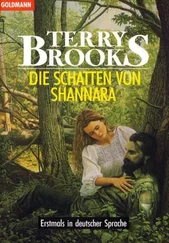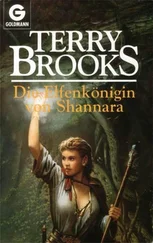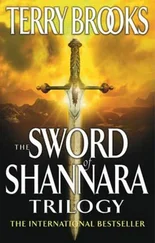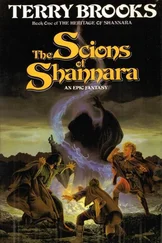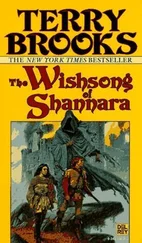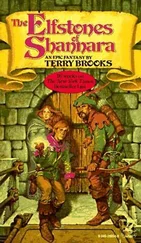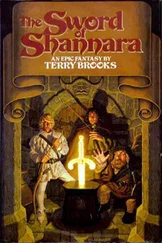As they walked, content to stay silent, mulling over their separate thoughts, the Borderman and the Druid apprentice did not speak to each other much. Mareth walked with her head up and her eyes forward, and her gaze seemed directed to something beyond what either of them could see. Kinson found himself wondering if she was pondering the possibility of her heritage in light of what she had learned from Bremen. That she was not his daughter, after thinking for so long that she must be, would be shock enough for anyone. That she was perhaps the daughter of one of the dark things that served the Warlock Lord was worse.
Kinson did not know how he would react to such a revelation. He did not think he would accept it easily. It did not matter, he thought, that Bremen insisted it could have no bearing on the sort of person Mareth was. There was more than logic at issue here.
Mareth was well-reasoned and intelligent, but the vicissitudes of her childhood and the complexities of her adult life had rendered her vulnerable to an undermining of the few beliefs she had managed to hold on to.
From time to time he considered speaking to her of this. He considered telling her she was the person she had always believed herself to be, he could see the goodness in her, he had witnessed the force of it firsthand, and she could never be betrayed by so tenuous a heritage as her blood. But he could not think of a way to frame the words so as not to make them appear condescending, and he was afraid to risk that happening. She seemed content simply to have him there, and in spite of his rude remarks when Bremen had suggested she come with him, he was secretly happy that she had. He had grown comfortable with her, with the history they shared, with their talks, with the way in which each knew what the other was thinking, and in the closeness he felt toward her in dozens of small ways he could not easily define. The latter came from such small things as the sound of her voice, the way she looked at him, and the sense of companionship that transcended simply the sharing of the journey. It was enough, he decided in the end, that he was there if she should decide she needed to talk. She knew that her father’s identity and origins made no difference to him. She knew that none of it mattered.
They reached Culhaven at sunset, the light fading, the air cooling, the smell of death harsh and pungent amid the shadows.
The home city of the Dwarves had been burned to the ground, and the land ravaged. Nothing remained but scorched earth, rubble, a few burned timbers, and scattered bones. Many of the dead had been left to lie where they had fallen. They were indistinguishable from one another by now, but the smallness of the bones revealed that some had been children. The Borderman and the apprentice Druid came out of the trees into the clearing where the city had stood, paused in sad appraisal, and then began to walk slowly through the carnage. The attack was weeks old, the fires long burned away, the land already regenerating from beneath the ruins, small green shoots poking up out of the ash. But Culhaven was empty of human life, and across the whole of its blackened sprawl the silence hung in curtains of indifference.
At the center of the city they found a vast pit into which hundreds of Dwarves had been thrown and their bodies burned.
“Why didn’t they run?” Mareth asked softly. “Why did they stay? They must have known. They must have been warned.”
Kinson stayed silent. She knew the answer as well as he did. Hope could play you false. He looked off into the distance, across the broad expanse of the ruins. Where were the Dwarves who were still alive? That was the question that needed answering now.
They moved on through the destruction, their pace quickening, for there was nothing left to see that they had not already seen in abundance. The light was fading, and they wanted to be well beyond the ruins when they set their camp for the night. They would find no food or water here. They would find no shelter There was nothing to keep them. They walked on, following the river to where it wound sluggishly out of the deep woods east. Perhaps things would be better farther on, Kinson thought hopefully Perhaps farther on there would be life.
Something scurried through the rubble to one side, causing the Borderman to start. Rats. He had not seen them before, but of course they were there. Other scavengers as well, he supposed. He felt a chill pass through him, triggered by a memory of a time of his boyhood when he had fallen asleep in a cavern he was exploring and had awakened to find rats crawling over him. Death had seemed oddly close in those brief, horrifying moments.
“Kinson!” hissed Mareth suddenly and stopped.
A cloaked figure was standing before them, unmoving. A man it appeared—there was enough of him revealed to determine this much at least. Where he had come from was a mystery. He had simply materialized, as if conjured from the air itself, but he must have been in hiding, waiting for them. He stood close to the riverbank on which they walked, shadowed by the night and the remains of a stone wall. He did not threaten them; he simply stood there, waiting for them to approach.
Kinson and Mareth exchanged a quick glance. The man’s face was concealed in the shadows of his hood and his arms and legs in the folds of his cloak. They could tell nothing of who he was, nothing of his identity.
“Hello,” Mareth ventured softly. She held the staff Bremen had given her like a shield before her.
There was no reply, no movement.
“Who are you?” she pressed.
“Mareth,” the other called to her in a slow, whispery voice.
Kinson stiffened. The voice had the feel of rat’s feet and the presence of death. He was back in that cave again, a boy once more. The voice scraped against his nerve endings like metal on stone.
“Do you know me?” Mareth asked in surprise. The voice did not seem to trouble her.
“I do,” said the other. “We all do, those of us who are your family. We have waited for you, Mareth. We have waited a long time.”
Kinson could hear the catch in her voice. “What are you talking about?” she asked quickly. “Who are you?”
“Perhaps I am the one you have been searching for. Perhaps am he. Would you think harshly of me if I were? Would you be angry if I told you I was...”
“No!” she cried out sharply.
“Your father?”
The hood tilted back, and the face within revealed itself. It was a hard, strong face, and the similarities to Bremen’s were more than token, though the man before them was younger. But the resemblance to Mareth was unmistakable. He let the young woman look on him momentarily, let her study him well. He seemed oblivious of Kinson.
He smiled faintly. “You see yourself in me, don’t you, child? You see how alike we are? Is it so hard to accept? Am I so repulsive to you?”
“Something is wrong here,” Kinson warned softly.
But Mareth didn’t seem to hear him. Her eyes were fixed on the man who said he was her father, on the dark-cloaked stranger who had appeared so unexpectedly before them. How? How had he known where to look?
“You are one of them!” Mareth snapped coldly at the stranger.
“One of those who serve the Warlock Lord!”
The strong features did not recoil. “I serve who I choose, just as you do. But your service to the Druids was prompted by your search for me, was it not? I can read it in your eyes, child. You have no real ties to the Druids. Who are they to you? I am your father am your flesh and blood, and your ties to me are clear. Oh, I understand your misgivings. I am not a Druid. I am pledged to another cause, one that you have opposed. All your life, you have heard that I am evil. But how bad am I, do you think? Are the stories all true? Or are they perhaps shaded by those who tell them to serve a purpose of their own? How much of what you know can you believe?”
Читать дальше
